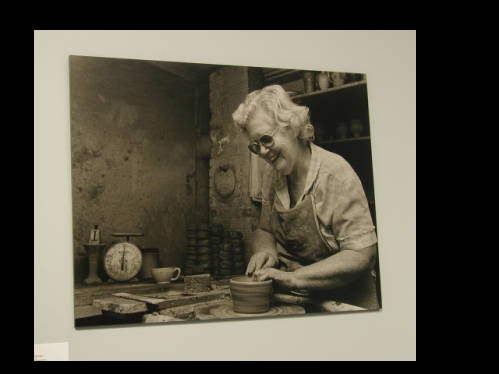State Art Medium of North Carolina: Clay
by Ardath Goldstein Weaver
Research Director, North Carolina Arts Council, 2013.
See also: North Carolina State Symbols and Official Adoptions main page
 Excerpt from Session Law 2013-189, House Bill 830:
Excerpt from Session Law 2013-189, House Bill 830:
Whereas, North Carolina's clay rich soil has contributed to the State's pottery heritage; and
Whereas, the use of clay has grown from the State's early Native Americans making mostly utilitarian wares and European settlers continuing the traditions of their ancestors to today's potters designing pottery with utilitarian and aesthetic elements; and
Whereas, the pottery tradition continues to thrive in North Carolina, especially in the Seagrove area, which includes parts of Chatham, Lee, Moore, Montgomery, and Randolph Counties; and
Whereas, clay continues to be an important art medium contributing to the State's cultural, social, and economic prosperity;
Clay is adopted as the official art medium of the State of North Carolina.§ 145-46. State art medium designated.
Clay is adopted as the official art medium of the State of North Carolina.
North Carolina clay has inspired artistic expression in craft, music and literature. It provided the name for the Red Clay Ramblers, the American folk string band, and the imprimatur of the Red Clay Reader, 1964-1970 publisher of North Carolina poets and writers.
The composition of clay affects the way it can be worked, leading to unique forms and techniques specific to each community.
‘Red clay’ evokes the Piedmont soil from Triassic sediments in Lee and Moore counties. The red clay potters in the Seagrove area still dig the clay out of the ground, the redder iron-laced clay from beneath the topsoil and the grey clay used in stoneware from creek beds.
The mountains produce kaolin from feldspar and mica deposits. This soft white clay is essential to porcelain and ceramic pottery.
The pottery tradition in North Carolina has evolved from utilitarian functionality to collectible art. Many art potters are associated with the Penland School of Crafts, which offers workshops in clay and studio space to resident artists. In its two-story clay studio, wheel-throwing, handbuilding and sculpting techniques are taught and evolved. The John C. Campbell Folk School also offers a wide range of classes in clay from beginner to perfecting glazes to building kilns. The Mint Museum of Craft+Design Education Resource Center documents the techniques of coil building, press molding, slab building and wheel throwing.
Many craft festivals and studio tours feature contemporary pottery, including the Seagrove Pottery Festival and the Appalachian Potters Market.
Red Clay Culture: https://www.ourstate.com/southern-roots-red-clay/
Seagrove Pottery Tour: http://www.ncfolk.org/nctravel/seagrovepottery.aspx
Penland Clay Studio: http://www.penland.org/about/clay_studio.html
Ceramics in North Carolina: http://ncartstrails.org/discovercraft/AboutNCCraft/Pottery.aspx
Mint Museum of Craft+Design Process: http://www.mintmuseum.org/chasanoff/process_demo/
28 June 2013 | Weaver, Ardath Goldstein